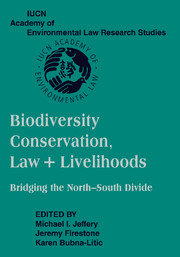 Biodiversity Conservation, Law and Livelihoods: Bridging the North-South Divide
Biodiversity Conservation, Law and Livelihoods: Bridging the North-South Divide Published online by Cambridge University Press: 31 July 2009
Our remote ancestors were so close to their environment that they would have found it hard to think of it as separate from themselves. When you live as hunters or fisherfolk, snatching your living directly from the wild … your dependence on the environment is absolute.
Human history has been one of progressive take-over on the flows of energy within natural systems, permitting ever-increasing human abundance and ubiquity. The impacts on the natural world have been immense. Early hunters altered ecosystems by fire, and their extermination of the largest and slowest-breeding animals. But agriculture – the taking of selected plants and animals into human ownership – had a more profound influence because it established the dichotomy between ‘domesticated’ and ‘wild’ and began the familiar struggle between the two. Pastoralists slaughtered the wolves or lions that preyed on their flocks and herds, and killed the deer and antelopes that competed with the beasts for pasture. Agriculturalists attacked the ‘weeds’ they could not eat and guarded their crops against wild herbivores as best they could. These conflicts remain important today.
So writes Martin Holdgate in The Green Web, and he adds: “We call this process of transforming nature ‘development.’”
Throughout history, humans have aspired to development, and the definition of the limits of development has been a controversial and conflicting process. Which development? for whom? and how? These are questions that are by no means new.
To save this book to your Kindle, first ensure [email protected] is added to your Approved Personal Document E-mail List under your Personal Document Settings on the Manage Your Content and Devices page of your Amazon account. Then enter the ‘name’ part of your Kindle email address below. Find out more about saving to your Kindle.
Note you can select to save to either the @free.kindle.com or @kindle.com variations. ‘@free.kindle.com’ emails are free but can only be saved to your device when it is connected to wi-fi. ‘@kindle.com’ emails can be delivered even when you are not connected to wi-fi, but note that service fees apply.
Find out more about the Kindle Personal Document Service.
To save content items to your account, please confirm that you agree to abide by our usage policies. If this is the first time you use this feature, you will be asked to authorise Cambridge Core to connect with your account. Find out more about saving content to Dropbox.
To save content items to your account, please confirm that you agree to abide by our usage policies. If this is the first time you use this feature, you will be asked to authorise Cambridge Core to connect with your account. Find out more about saving content to Google Drive.